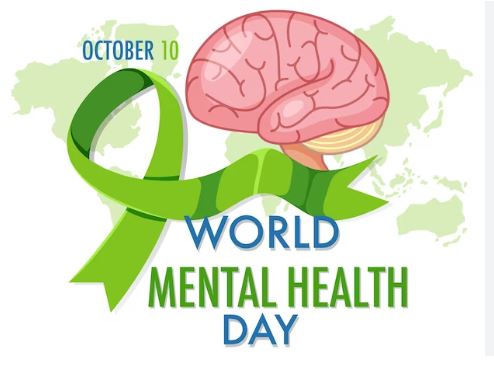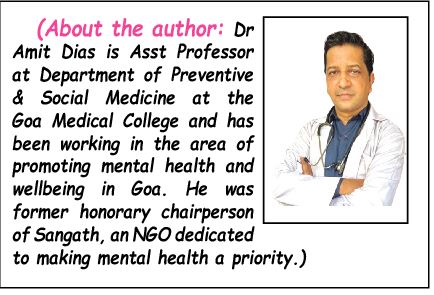Goa is abuzz with excitement as vintage bike and car owners, users, collectors and fans are decking […]

LET’S MAKE MENTAL HEALTH A UNIVERSAL HUMAN RIGHT!
MIND & BODY, HEART & SOUL, Oct 07- Oct 13 2023 October 6, 2023A World Mental Health Day Special
World Mental Health Day is observed on October 10 every year and this year is centered around the theme of “Mental Health: A Universal Human Right.” Dr AMIT DIAS emphasizes that everyone is worthy of happiness and peace of mind. Mental health is a right. Be kind to your mind!
Goan Observer: Doctor, could you throw light on the theme this year for World Mental Health Day? How is mental health a right?
Dr Amit Dias: I am sure you will agree that “health” is a right. You should also remember that there can be no health without mental health, and therefore mental health is also a right. The theme this year is about mental health and how this is a universal human right. I urge you to promote mental wellbeing for everyone. In our society we often come across several barriers to mental health care.
Discrimination against people with mental illness, lack of awareness and stigma, lack of services, these are just some of the things we should pay attention to…people with mental illness are often abused and neglected. This has to change.
Everyone has a right to the highest attainable standard of mental health. This includes the right to be protected against mental health risk, the right to accessible, acceptable good quality care. Everyone needs to be mentally and emotionally healthy.
Q: What does it meant to be mentally and emotionally healthy?
A: Being mentally and emotionally healthy is much more than being free from anxiety and depression or other psychological ailments. More than the absence of mental illness, mental health is the presence of positive characteristics. A mentally healthy person should have:
1) A zest for living, the ability to have fun and laugh.
2) Should be able to deal with stress and bounce back from adverse situations.
3) Be flexible in learning new skills and adapt to new changes.
4) Be able to balance work, rest and recreation.
5)Should have self-confidence and high self-esteem
Having good mental health does not mean you will never have sad moments in your life. But mentally healthy people will be resilient and will be able to bounce back from adversities.
Q: What advice would you give our readers for ensuring mental wellbeing?
A: There is a lot that we can do to prevent mental illness and promote wellbeing:
Stay connected: In a recent interview we learnt that loneliness is now considered a risk factor for disease and it is found to be equivalent to smoking 15 cigarettes per day. Man is a social animal, so stay connected. There can be no replacement for physical contact. Surround yourself with positive people, it will keep you positive.
Sleep well: Sleep is very essential for our mental health. Ensure that you don’t neglect your sleep and practice sleep hygiene. One of the interventions we had in the DIL project was called brief behavioural al therapy for insomnia. We would identify sleep related issues and teach them non- pharmacological techniques to sleep well. You need to feel fresh when you wake up in the morning.
It’s OK to Talk: SHARING your problems with someone can help relieve the stress to quite an extent. Find someone non-judgmental and with empathy to speak to. Counselors are trained in these skills and can help you arrive at the right decision. We also have a lot of helplines to provide assistance.
Do what you enjoy doing!
Find out something healthy that you like doing. It could be something as simple like singing, dancing, cooking, running, reading, pressing a stress ball, talking with friends, taking a walk on the beach… make time for yourself and things that you like to do.
Encourage Exercise In our study on prevention of depression in late life (The DIL Study) we found that physical activity played a major role in preventing depression in the elderly. We tend to be physically active in school and sometimes have absolutely no physical activity later on. Staying physically active has multiple benefits.
Meditate Adopt any method for meditation, you have access to a number of techniques. They will help keep you calm.
Eat healthy food You cannot have good mental health if you have a compromised physical health. Out diet plays an important role in our overall physical as well as mental wellbeing. Be conscious of what you eat, after all we are what we eat.
Have a goal in life Many people complain that they feel worthless and useless. Find a goal for yourself and something to look forward to. For example, volunteer in the church or temple group or an NGO and assist people. Spend time with relatives who make you feel special.
Visit an appropriate specialist
If you feel you have a problem, then visit a mental health specialist and talk about it.
Q: What is your advice to our readers?
A: When it comes to mental illness, the biggest barriers to social inclusion and appropriate care, have been stigma and discrimination. We need to collectively play our part in increasing awareness about early detection and prevention and fight stigma and the misconceptions that surround mental illness.
The good news is that it is never too late to change your path. Let us free our minds from insults, defeats, struggles, guilt, past mistakes, nasty things that people said to us, and our inabilities….we need to de-clutter our mind from the past and look forward to a brighter future for ourselves and the people around.
Your failures are just milestones on the path to happiness. It’s OK not to be OK, it’s OK to talk. You need to make the right choices to be happy. Remember we need to work to get happiness, it will not fall in our lap. … as you tread this path, you will realize that there is no actual “path to happiness”….happiness is the “path.”
















